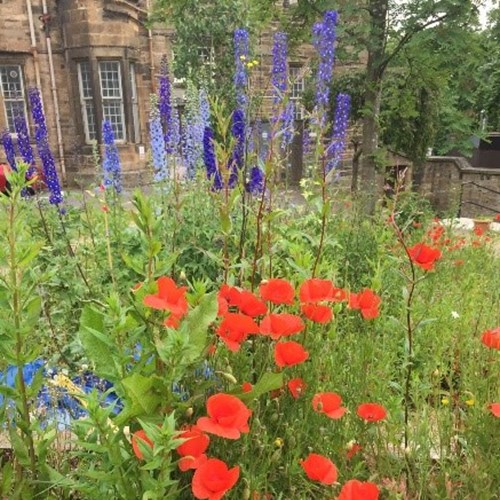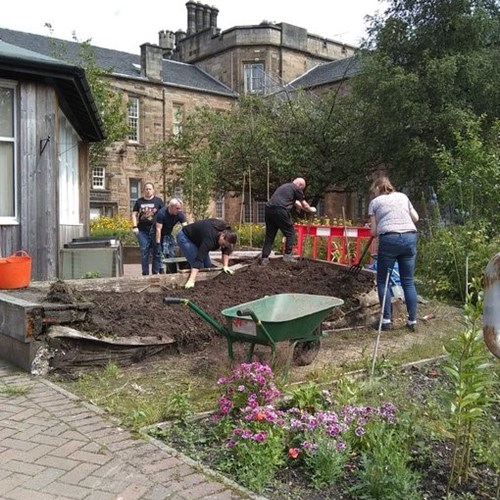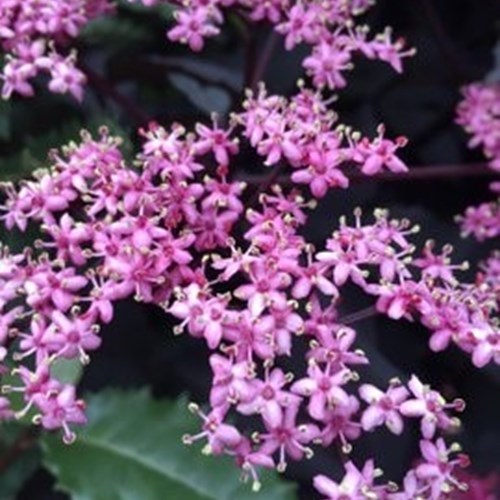Volunteers help to maintain the gardens as part of the Art in the Gart programme at Gartnavel Royal Hospital in Glasgow. Volunteering has continued throughout the COVID-19 pandemic – with some changes due to physical distancing requirements – and the garden spaces have provided a welcome haven for the local community during lockdown.
Gartnavel Royal Hospital's Walled Garden and Summerhouse form part of the Glasgow hospital's 200-year history. The Walled Garden was previously the private garden of the hospital superintendent. It was one of 4 green spaces chosen as a demonstration project by the Green Exercise Partnership – a joint venture between the Forestry Commission Scotland, NHS Health Scotland and Scottish Natural Heritage. The Partnership worked together to reinstate the Summerhouse and develop the Walled Garden, to bring them back to life by modernising and making them more accessible. This was done by installing raised beds and creating growing space.
This work took place at the same time as Fiona Sinclair came into post as the Voluntary Services Manager for Art in the Gart, a patient-led arts and gardening based programme within Gartnavel Royal Hospital. Fiona was interested in who the green spaces were for and learned that there was no ownership or core purpose for the gardens.

Fiona was able to secure the 4 garden spaces as part of the 'green arm' of the Art in the Gart creative volunteering programme. She told me, "The priority of the volunteer programme is to support the mental health recovery and wellbeing of acutely ill patients in Gartnavel Royal Hospital wards, while also providing an outdoor and wellbeing resource for anyone using the NHS Greater Glasgow and Clyde services on the Gartnavel Campus. This includes NHS staff, volunteers and the wider community in the west end of Glasgow."
Fiona was keen to point out that the green spaces were not a new thing for the hospital and explained that it was really a matter of picking up where previous staff members had left off decades before. There had been no investment in terms of money or time in the green spaces, for a variety of reasons.
Throughout the year, 79 gardening volunteers make up the programme, including volunteers who come in through a corporate volunteering programme. They are responsible for keeping the green spaces healthy and tasks include watering and feeding plants, trees and shrubs, weeding, sowing seeds and seedlings, pruning, taking cuttings to generate more plants and ground clearing. The tasks vary as the seasons change.
When the COVID-19 pandemic began to really take hold in March 2020, there were many decisions to make in regard to volunteering in NHS services and the majority of volunteers in NHS Scotland were stood down. Fiona told me, "We initially stopped all volunteering when lockdown came into play, and all gardening activity went on hold for around a fortnight. It was the start of the growing season, which is an important time for gardening. I liaised with senior management around re-starting some form of volunteer activity and completed a risk assessment. It was agreed we would re-start some volunteering to keep the gardens ticking over."

Fiona approached some of the more established volunteers to ask if they would be happy to get involved and a small group was assembled. There were of course important guidelines to follow, including ensuring volunteers were adhering to the 2-metre social distancing whilst in the gardens. Fiona put up signage so that members of the public visiting the gardens would ensure they also kept to the social distancing rules.
Initially there were 6 volunteer gardeners, one of whom would access the site each day with coordination from Fiona. Fiona then expanded this to 2 volunteer gardeners per day after consultation with hospital management and estates staff. Fiona told me, “The volunteer gardeners did very well during this time."
Gardening is one of the few volunteering roles in NHS Scotland that has continued during COVID-19 under the existing role description, and this is down to the fact that although it is on a hospital site, it is undertaken outdoors and is non-patient facing.
I spoke with Margaret Robertson, one of the volunteer gardeners who continued volunteering during lockdown. Margaret has been in her role for 4 years and lives locally to the gardens. I asked Margaret how she came into the role and she explained, "I am a keen gardener and when I took early retirement, I tried a volunteer role sitting on the Board of an organisation. This felt too much like being employed, so I was looking for something else and I saw an advertisement for the volunteer gardener role. I myself have a garden and recognised the positive effects gardening has on mental health."
Margaret did not hesitate in agreeing to support the programme by coming back during lockdown and stated, "When I am in the gardens, it is the happiest time of my week."
I asked Margaret what impact the role has had on her and she explained that she has made invaluable friendships with other volunteers, and that they have a buddy system so as not to feel isolated in the gardens. Margaret told me how much she enjoys "sitting down for a socially distanced break and chat with my buddy Ruth, whilst having a coffee and a bun."
During COVID-19 the gardens have gained a great deal more visitors, due to many more people out walking in their local area due to travel restrictions. Fiona told me that there had been at least a 500% increase in visitors to the green spaces.
Margaret stated she has seen many more visitors come to the gardens and express surprise are having such a beautiful mature garden space locally, that they were not aware of. Margaret told me, "We are seeing so many more families and older people taking an interest in the green spaces at Gartnavel, and it has been enjoyable as volunteers take great pride in the gardens."
The volunteers also have a stall where members of the public can take plants, cuttings and seedlings away in return for a small donation to the gardens. Margaret told me how much enjoyment members of the public got from being able to get plants at a time when garden centres were closed.
It seems in many ways the green spaces at Gartnavel have had a visible impact on the wider community, during the pandemic. This was beneficial for many residents living in an area of Glasgow that is predominately tenements. Local people were able to have time in a local garden, which is proven to be extremely beneficial for mental health at a time when many were feeling anxious and apprehensive about daily life.

Fiona was keen to point out that the gardens wouldn't have been accessible if it hadn't been for the dedication and flexibility of the volunteers, and described them as a real credit to the programme. Margaret in turn explained that she would have been unable to volunteer had it not been for the incredible support shown by Fiona as Voluntary Service Manager.
Gardening and being in green spaces boosts physical and mental health and it is beneficial to have accessible garden spaces on hospital sites, where patients, staff and local people can enjoy the serenity and peace they provide. Gardening and gardens have come to the rescue of many people and Fiona put it best when she told me these green spaces are more vital than ever, providing an opportunity to "pause, breathe and connect".
Fiona and Margaret were interviewed by Lisa Taylor from the Volunteering in NHS Scotland Programme at Healthcare Improvement Scotland. Due to the ongoing COVID-19 pandemic, all interviews within this case study were undertaken remotely via telephone.
